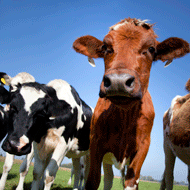Rise in overfat cows could cause calving problems

Farmers are advised to put overfat cows on a well balanced, straw-based diet, to help them slim down prior to calving.
Experts from Scotland's Rural College (SRUC) have forecasted a rise in calving difficulties this spring, as last year's excellent summer could mean cows will be too fat come calving time.
After a cold spring last year, Britain enjoyed a warm season with good grass growth, producing quality silage and hay. Experts have warned farmers to take this extra nutrition into account and adjust their feeding regimes.
Well known beef specialist Dr Basil Lowman, from SAC Consulting, says this is a problem he has seen in many herds he has visited this winter.
"Some producers are concerned about the condition of their cows and the potential for a much higher risk of calving difficulties when calving starts in a month’s time," he says.
Problems during calving are linked to the genetics of the cow and her calf, and the condition and management of the cow at calving.
According to SRUC, producers are agreed that these difficulties result in major costs, such as an increased risk of disease and even death of the calf if it is slow to get going.
Additionally, calving difficulties can cause a drop in fertility in the cow and, in severe cases, can lead to premature culling.
SAC has advised suckled calf producers to set aside an hour with their vet, or a friend or neighbour, to discuss the condition of their cows and identify any that need to be slimmed down.
Dr Lowman says: "If there are a proportion of obese cows, with rings of fat clearly visible around their tail-head then these should be drawn out into a separate group and put onto a well balanced, straw-based ration to encourage them to lose as much fat as possible prior to calving.
"This may seem like extra cost and hassle but compared with severe calving difficulties, caesareans or even casualties it will be time and money extremely well invested.
An example of a suitable slimming ration, as advised by Dr Lowman and colleagues:
Straw - Ad-lib
Rapeseed meal - 2kg per cow daily
Mineral and vitamin mix suitable for straw-based rations - 120g per cow daily
Producers are warned, however, that feeding straw alone is not possible. The protein and mineral or vitamin intake must be maintained, or their rumen will be impacted resulting in death.



 HMRC has invited feedback to its communications regarding the employment status of locum vets and vet nurses.
HMRC has invited feedback to its communications regarding the employment status of locum vets and vet nurses.